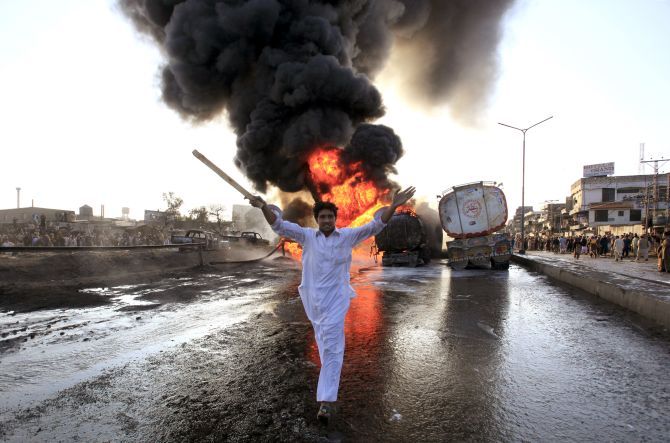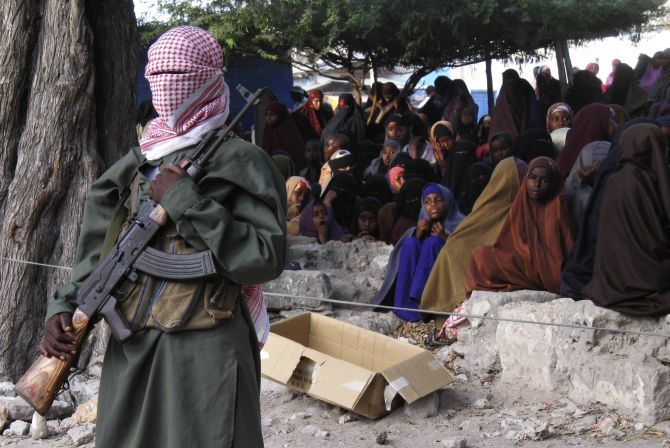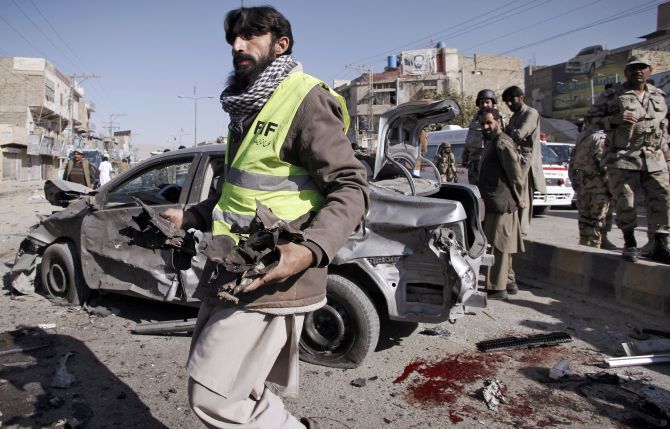
The Country Threat Index compiled by IntelCenter, a Washington-based company working for intelligence agencies, has placed Pakistan 8th in its list of the most dangerous countries in the world.
Afghanistan, the only other South Asian country in the list, is placed fourth, while Iraq ranks first.
The rankings were prepared after examining the volume of terrorist and rebel alerts, messaging traffic, videos, photos, incidents and the number of killed and injured in a country over the past 30 days.
There are a total of 45 countries with a CTI greater than zero. The average CTI for these countries is 74 and the global CTI is 3,313.
Iraq
Rank 1
CTI score: 576

Iraq tops the Country Threat Index as the most dangerous country in the world.
Insurgency continues to cause thousands of fatalities even as the country faces political instability.
In February 2011 the Arab Spring protests spread to Iraq and in 2014 Sunni insurgents belonging to the Islamic State terrorist group seized control of large swathes of land including major Iraqi cities, like Tikrit, Fallujah and Mosul.
Nigeria
Rank 2
CTI score: 458

Nigeria has been a victim of ethnic violence because of its diverse ethno-linguistic groups.
The country has been witnessing sectarian violence by Islamist movement Boko Haram that seeks to abolish secular system of government and establish Sharia law.
Thousands have been killed by religious violence in Nigeria. In May 2014 Benin, Chad, Cameroon and Niger joined Nigeria in a united effort to combat Boko Haram in the aftermath of the 2014 Chibok kidnapping of 276 schoolgirls.
Somalia
Rank 3
CTI score: 336

Somalia has been a happy hunting ground for radical Islamist groups. It suffers from ineffective government, famine, piracy and militant extremism.
Al Qaida-affiliate Al Shabaab, an Islamist armed group organisation, holds sway over the region.
Somalia’s long-running armed conflict has been responsible for serious violations of international law and abuses.
On April 14, Al-Shabaab attacked Mogadishu's main court complex leaving at least 30 civilians dead. An attack on the UN compound in Mogadishu killed at least 14 people. On September 7, at least 15 people were killed in an attack on Village restaurant, popular among journalists and politicians, for the second time in under a year.
Afghanistan
Rank 4
CTI score: 309

Innocent lives are lost to insurgency in this country with the Taliban stepping up attacks across the country. As foreign troops wind up their combat missions by December 31, the attacks have only increased.
A Reuters report says that civilian casualties were up by 24 percent in the first half of the year to 4,853, according to the United Nations. About 4,600 members of the Afghan security forces were killed as of November, up more than 6 percent over the corresponding period of 2013.
The past 12 months having been the bloodiest since 2001, with thousands of Afghans dying in fighting.
Yemen
Rank 5
CTI score: 290

Yemen faces a growing humanitarian crisis, with nearly half the population lacking sufficient food, according to UN agencies.
According to the Human Rights Watch report, the fragile transition government that succeeded President Ali Abdullah Saleh in 2012 following mass protests has failed to address multiple human rights challenges.
Conflict-related abuses, legally sanctioned discrimination against women, judicial executions of child offenders, and non-accountability for the previous government’s human rights violations all persisted.
Syria
Rank 6
CTI score: 233

The 3-year old civil war that has gripped the country has killed thousand and resulted in war crimes. Minority Alawites and Christians have been increasingly targeted by Islamists and other groups fighting in the Syrian civil war.
The unrest began in the early spring of 2011 with nationwide protests against President Bashar al-Assad's government, whose forces responded with violent crackdowns. As of April 2014 the death toll had risen above 190,000.
The humanitarian disaster in Syria has been outlined by the United Nations and several international organisations. More than 6.5 million Syrians have been displaced, more than 3 million Syrians have fled the country and millions have been left in poor living conditions with shortages of food and drinking water.
Libya
Rank 7
CTI score: 166

The Civil War in Libya is an armed conflict fought between Islamist forces and forces aligned with the Libyan parliament and General Khalifa Haftar.
Prominent Islamist incidents in 2013-14 included the kidnapping of Prime Minister Ali Zeidan in October 2013, and the kidnapping of Egyptian diplomats in January 2014. Both incidents were carried out by the Libya Revolutionaries Operations Room.
Pakistan
Rank 8
CTI score: 162

Pakistan has been facing religious extremism and sectarian violence. Terror outfits like the Lashkar-e-Tayiba, the Harkat-ul-Mujahideen and the Tehrik-i-Taliban Pakistan are a threat to the citizens of Pakistan.
According to a policy document on internal national security, Pakistan is the country most affected by terrorism in the world after Iraq, but if the severity of the incidents is considered, it even surpasses the Middle Eastern nation.
The report states that from 2001 to 2013, there were 13,721 incidents in Pakistan which is marginally less than Iraq. From 2001 to 2005, there were 523 terrorist incidents in Pakistan but from 2007 to November 2013, the total number of incidents has risen to 13,198.
According to data released by the US National Consortium for the Study of Terrorism and Responses for Terrorism (Start), Pakistan led the chart with 1,404 terrorist attacks in 2012.
Egypt
Rank 9
CTI score: 95

Egypt has been in political turmoil since the overthrow of military dictator Hosni Mubarak during the 2011 Egyptian Revolution and later under Morsi, the country's first democratically elected president.
Morsi's term was plagued by political uncertainty and violence in a deeply polarised country that ultimately led to his ouster by the powerful military.
Kenya
Rank 10
CTI score: 86

Violence in Kenya has been escalating and attacks on tourists have contributed to a steep decline in tourism in Kenya.
Since the attack on Nairobi's upmarket Westgate Mall killed more than 70 and injured scores, northern Kenya, from the Somali border to Mombasa, has suffered from a string of bomb and grenade attacks, killing dozens. Most incidents have targeted public venues such as churches, nightclubs, and bus stations, reports Aljazeera.
The Al-Shabab had claimed responsibility for the Westgate attack and vowed to continue its attacks until Kenya withdrew its troops from Somalia.
The attack on Nairobi's upmarket Westgate Mall killed more than 70 and injured scores.
Al-Shabab claimed responsibility for the Westgate attack via Twitter, vowing to continue wreaking destruction until Kenya withdraws its troops from Somalia.










